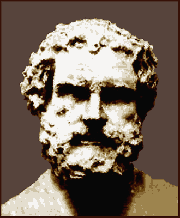|

Democritus.
|
Born at Abdera, in Thrace, Democritus
is the most relevant figure of Greek atomism. Numerous works on differing
subjects are attributed to him, the most important being the Small
Cosmology. This work - gathered together, it seems, in a unique
copy by the scholar Trasilo, who lived at the court of Tiberius in
the mid-first century, A.D. - survives only in a few fragments. These,
however, are sufficient to give us an idea of the salient points of
democritean speculation.
Atoms and voids are the two fundamental
concepts which support the entire democritean explanation of the physical
universe. Atoms (from the Greek a-tomos "without parts") represent
the prime, non-divisible building-blocks of all reality, bodies being
nothing but a mass of atoms. Eternal, immutable, indivisible, impenetrable,
infinite in number and their differing forms, atoms differ also in
their dimensions, and, before bring our world into being, were dispersed
in empty and infinite space. They lack any perceivable quality except
for "size" and "geometric form". But, through our sense-organs, they
produce differing sensations (colours, sounds, smells, etc.). The
soul, too is, according to Democritus, a mass of atoms: "psychic"
atoms, which are spherical and particularly mobile.
The atoms, moving and combining in the original
void, form all of material reality, following strict mechanical laws.
The motion of atoms is characterised by collisions and unforeseen
changes in speed, which give rise to a series of vortices of various
sizes. All bodies and an infinite series of worlds are produced from
these vortices, because, according to Democritus, worlds are infinite
in time and space.
Democritean atomism is historically extremely
important, offering a rigorously mechanistic and deterministic model
which has been enormously suggestive throughout the course of history
of science and Western philosophy.
|

